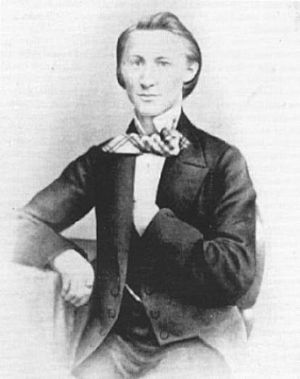Julius Reubke facts for kids
Friedrich Julius Reubke (born March 23, 1834 – died June 3, 1858) was a talented German composer, pianist, and organist. Even though he lived a very short life, he created some amazing music. His most famous work is the Sonata on the 94th Psalm for the organ. Many people think it's one of the best organ pieces ever written in classical music.
Contents
Julius Reubke's Early Life and Family
Julius Reubke was born in Hausneindorf, a small village in Germany. This village is located near the Harz Mountains. He was the oldest son of Adolf Reubke, who built organs and pianos.
Julius had five brothers and sisters. Two of his brothers, Emil and Karl, also worked with their father. Emil later took over the family business. Julius's brother Otto was also a skilled pianist, organist, and composer. Otto helped publish Julius's famous Sonata on the 94th Psalm in 1871. Otto later became a professor and director at the University of Halle. Julius also had two sisters, Meta and Alma.
Musical Training and Influences
Julius Reubke first learned music in Quedlinburg from Hermann Bönicke. In 1851, he moved to Berlin to continue his music studies. He attended a special music school there. He learned piano from Theodor Kullak and composition from Adolf Bernhard Marx.
In Berlin, Julius met musicians who were part of the Neudeutsche Schule (New German School). This group included conductor Hans von Bülow and organist Alexander Winterberger. Both of these musicians were connected to the famous composer Franz Liszt.
Studying with Franz Liszt
In December 1855, Franz Liszt visited Berlin. On the advice of Hans von Bülow, Liszt agreed to teach Julius Reubke. From February 1856, Julius studied piano and composition with Liszt in Weimar. Liszt even let Julius live in his home.
It was during this time that Julius Reubke wrote his two most important pieces. He composed his Piano Sonata in B-flat minor between December 1856 and March 1857. He finished his Sonata on the 94th Psalm for organ just one month later. He also thought about writing an opera.
The organ sonata was dedicated to Professor Carl Riedel. Julius himself performed it for the first time on June 17, 1857. This performance took place at Merseburg Cathedral. Since then, this piece has been seen as one of the best works of the Romantic music period.
Julius Reubke's Declining Health
Sadly, Julius Reubke's health was already getting worse when he wrote his great compositions. A friend named Richard Pohl described how Julius would play his sonata:
Playing us his sonata, seated in his characteristically bowed form at the piano, sunk in his creation, Reubke forgot everything about him; and we then looked at his pale appearance, at the unnatural shine of his gleaming eyes, heard his heavy breath, and were aware of how wordless fatigue overwhelmed him after such hours of excitement. We suspected then that he would not be with us long.
In December 1857, Julius moved to Dresden. By this time, he was suffering from tuberculosis, a serious illness. He no longer had the energy to play music or compose. In May 1858, he moved to a health resort in Pillnitz. He died there a few days later, at only 24 years old. He was buried near the church of Maria am Wasser on June 7.
Franz Liszt thought very highly of Julius Reubke. After Julius's death, Liszt wrote a letter to Julius's father. He expressed his sadness and admiration:
Truly no one could feel more deeply the loss which Art has suffered in your Julius, than the one who has followed with admiring sympathy his noble, constant, and successful strivings in these latter years, and who will ever bear his friendship faithfully in mind
Main Compositions
- Piano Sonata in B-flat minor (1857) - This piano piece was influenced by Liszt's Sonata in B minor.
- Sonata on the 94th Psalm in C minor (1857) for organ - This organ piece was influenced by Liszt's Fantasy and Fugue on the chorale "Ad nos, ad salutarem undam".
- Trio in E-flat major for organ (1850)
- Mazurka in E major for piano (1856)
- Scherzo in D minor for piano (1856)
- Adagio in E minor for organ
Lost Works
Some of Julius Reubke's other compositions are now lost. These include:
- An Overture (a piece of music played at the start of a show or opera)
- Several songs for a mezzo-soprano (a type of singer) and piano
- A Chorale-variation on O Haupt voll Blut und Wunden (a piece based on a church hymn)
See also
 In Spanish: Julius Reubke para niños
In Spanish: Julius Reubke para niños
 | George Robert Carruthers |
 | Patricia Bath |
 | Jan Ernst Matzeliger |
 | Alexander Miles |


